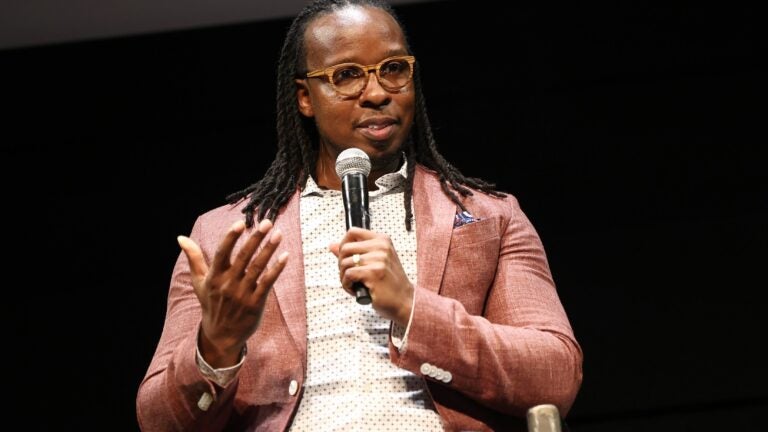Newsletter Signup
Stay up to date on all the latest news from Boston.com

Following news of mass layoffs and an official inquiry into Ibram X. Kendi’s Center for Antiracist Research at Boston University, the famed author is pushing back on allegations of mismanagement from current and former employees.
After laying off 19 of the center’s 36 staff members last week, Kendi told The Boston Globe in an interview that the reorganization was strategic and not tied to financial solvency.
“This was a tough decision and of course it elicited a lot of strong opinions,” Kendi told the newspaper. “At the same time, I had to take the long view to ensure that the center would be impactful and sustainable 20, 50 years from now, particularly in a moment when racial justice organizations, and social justice organizations more broadly, are under serious attack.”
He explained that the layoffs represent the center’s shift from a “high-growth startup” pursuing a plethora of projects to “the world’s first residential fellowship program for antiracist intellectuals,” a less costly model that stretches the center’s funding further, the Globe reported.
Following the layoffs, Boston University — where Kendi launched the center in June 2020 — confirmed it received complaints about the organization’s culture and grant management. The university said it is looking at both angles as part of its inquiry into the Center for Antiracist Research.
Boston.com reached out to Kendi and the center for comment on the inquiry; neither has responded.
The university’s interim president, Kenneth W. Freeman, addressed the controversy in an interview with BU Today, explaining that the employee complaints involved “project and center management, meaning, was the Center sufficiently productive in terms of the research grants it received, and did the Center’s management afford its people the appropriate support and respect for their contributions?”
Kendi defended the center’s track record in his interview with the Globe.
“We’ve been able to develop a number of projects,” Kendi told the newspaper. “But more so than anything, we’ve been able to begin to allow for other scholars and intellectuals to recognize the importance of antiracist research on a college campus.”
According to the Globe, the center has contributed funding to numerous research projects, launched the online newspaper The Emancipator, drafted model legislation, and organized two “policy convenings” on antibigotry and racial and ethnic data collection. Still, the Globe noted, key projects like a graduate degree program and a national Racial Data Tracker have yet to materialize.
Staffers who spoke with the Globe also critiqued Kendi’s leadership, asserting that he held decision-making power but was often unavailable. Kendi disputed that criticism, telling the Globe he delegated authority through a robust leadership structure.
“I thought it was important for different people to have the authority to make decisions,” he told the newspaper. “As somebody who is pretty regularly speaking, and writing, and obviously engaging with people to support the center, I couldn’t always be there to make every decision.”
As for the future of the Center for Antiracist Research?
Freeman described the recent layoffs as “very painful and difficult,” but said he doesn’t envision restoring the center to its previous size or research focus.
“Dr. Kendi has made a compelling case that the reorganized center requires a smaller staff than what was previously needed,” Freeman told BU Today.
“The national conversation to combat racism is important and critically necessary, and it is under siege right now,” he added. “There are some who want to turn back the clock, shut down the conversation, and rewrite history. We must make sure that we, as a university, do whatever we can to keep the conversation alive and always moving forward.”
Stay up to date on all the latest news from Boston.com
Stay up to date with everything Boston. Receive the latest news and breaking updates, straight from our newsroom to your inbox.
Conversation
This discussion has ended. Please join elsewhere on Boston.com